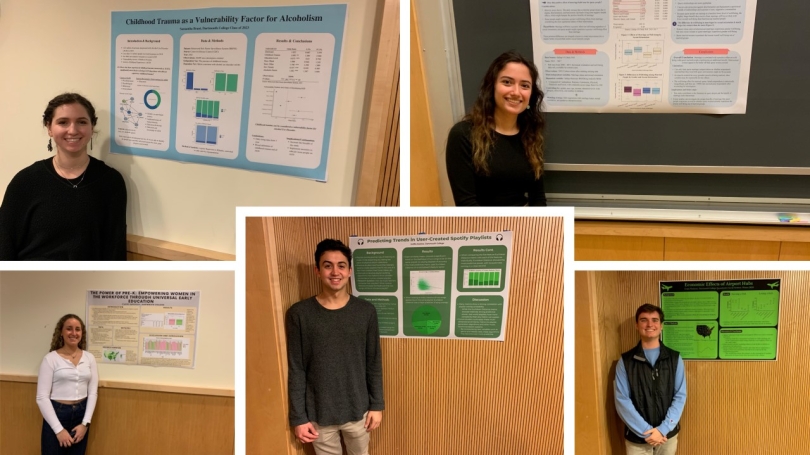
- Undergraduate
- Research
- About the Program
- News & Events
- People
Back to Top Nav
Back to Top Nav
Back to Top Nav
Back to Top Nav
On Monday, March 6, students majoring and minoring in Quantitative Social Science (QSS) presented posters from research projects carried out in QSS 82. In Winter 2023, this project course was taught by Senior Lecture Robert Cooper and Lecturer Peter DeWan. There were 42 posters across the three sections of QSS 82 taught by Professors Cooper and DeWan.
The recent QSS 82 poster session provides a venue for the public presentation of capstone research projects carried out by graduating QSS students. These projects represent independent research efforts implemented under professorial guidance, and the posters QSS students presented in March 2023 summarize, visualize, and communicate the findings of many quantitative research endeavors.
This March, QSS 82 research projects had subjects ranging from the economic effects of airport hubs, predicting trends in user-created Spotify playlists, the power of Pre-K, and how remote work affects local economies.
According to Professor DeWan, "We had a wide variety of topics this year. One student, who had been working on a childhood program in Peru, determined that the switch to virtual during the pandemic did not materially reduce the program's effectiveness. Another showed that in-group religious bias by judges in India was affected by recent events of civil unrest. The switch from regression-based models to machine-learning models that is apparent all over industry is also reflected in my students' work, with an increasing number pursuing research using machine learning models and exploring the cutting edge of theory in that area."
Professor Cooper wrote, "At the beginning of the quarter, students have the opportunity to develop their own research question. Students are encouraged to research whatever topic motivates them, assuming data are available. Students in QSS 82 have weekly checkpoints, but much of their work is self-directed. The most challenging part of each project is deciding how to best answer its research question. After many meetings, we make decisions about the best path forward. In meetings, the back and forth is usually collaborative, because the student usually knows a great deal about their topic, while I provide knowledge about the class of methods most appropriately used to answer the question. This year, topics ranged from racial and ethnic differences in postpartum hemorrhages to the effects of distant sea surface temperatures on quality surfing days, and from the effects of quality passes in hockey to the impact of artificial intelligence on the opening moves chosen by intermediate chess players."